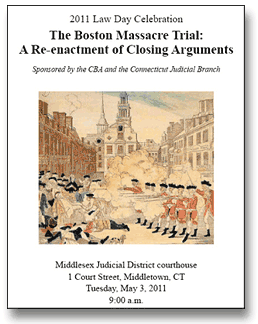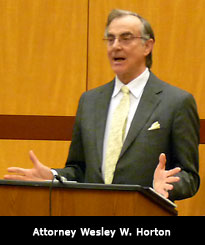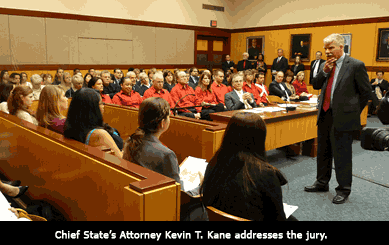|
|
|
|
Law Day 2011
|
Law Day 2011 Home |
|
 Boston Massacre Trial Re-Enactment
Highlights Middlesex JD, CBA Law Day Ceremonies
MIDDLETOWN, May 3, 2011—The knee-high pants and leggings and
pony-tail were missing but all the fire and brimstone of John
Adam’s rhetoric were well-represented by noted Appellate
Attorney Wesley W. Horton of Hartford in a re-enactment of the
Boston Massacre Trial’s closing arguments at the Middlesex
Judicial Courthouse. Boston Massacre Trial Re-Enactment
Highlights Middlesex JD, CBA Law Day Ceremonies
MIDDLETOWN, May 3, 2011—The knee-high pants and leggings and
pony-tail were missing but all the fire and brimstone of John
Adam’s rhetoric were well-represented by noted Appellate
Attorney Wesley W. Horton of Hartford in a re-enactment of the
Boston Massacre Trial’s closing arguments at the Middlesex
Judicial Courthouse.
The Re-Enactment, co-sponsored by
the Connecticut Judicial Branch and the Connecticut Bar
Association (CBA) was part of its Law Day activities and
reinforced this year’s theme—The Legacy of John Adams: From
Boston to Guantanamo.
Horton, who took the part of John
Adams, and Chief State’s Attorney Kevin Kane, who assumed the
role of King’s Attorney, apparently did their homework in
preparing for the mock trial because their back-and-forth
exchanges truly brought all those gathered back to the days of
the controversial trial.
 The trial was the result of a
fateful night in 1770 when a young boy, bruised and battered ran
home following a still undetermined encounter with a British
sentry at the Customs House in Boston—where the King’s money was
held. A group of enraged Bostonians came back and confronted the
sentry and other British soldiers, hurling invectives at them
and pelting them with snowballs, rocks, oyster shells and any
other objects they could find. Though laws of the Colony
prohibited the soldiers from firing upon citizens, things got
out of hand and the soldiers did just that—resulting in the
deaths of five colonists and the injuries of others. The trial was the result of a
fateful night in 1770 when a young boy, bruised and battered ran
home following a still undetermined encounter with a British
sentry at the Customs House in Boston—where the King’s money was
held. A group of enraged Bostonians came back and confronted the
sentry and other British soldiers, hurling invectives at them
and pelting them with snowballs, rocks, oyster shells and any
other objects they could find. Though laws of the Colony
prohibited the soldiers from firing upon citizens, things got
out of hand and the soldiers did just that—resulting in the
deaths of five colonists and the injuries of others.
Adams believed in the rule of law and, as such, took up the
defense of the soldiers for this belief but also because no one
else would.
The Hon. Robert L. Holzberg, Administrative
Judge for the Middlesex Judicial District, opened the Law Day
Ceremonies by saying, “As we pause to reflect on the importance
of the legal system in our constitutional system of government,
we are delighted to join with the Connecticut Bar Association in
presenting a re-enactment of one of this country’s most
important trials.
“Though it occurred over two centuries
ago, the Boston Massacre Trial raises important issues
concerning the relationship between individual rights and
liberties and the government’s obligations to protect the safety
of its citizens that is still the source of legal disputes
today,” Judge Holzberg added.
Judge Barbara M. Quinn,
Chief Court Administrator for the Connecticut Judicial Branch
followed with her remarks saying, “More than ever, we need to do
everything we can to protect the rule of law. Quite simply, it
is the difference between democracy and anarchy. Celebrations
such as this play an important role in educating the people as
to why we must ensure that this essential role in democracy is
not compromised.”
Attorney Lisa A. Faccadio, President
of the Middlesex County Bar Association and Attorney Ralph J.
Monaco, President of the CBA, then welcomed all the participants
and emphasized the importance of the Boston Massacre Trial and
legal history and laws.
Throughout the trial Attorneys
Horton and Kane recited actual arguments by Adams and the King’s
Attorney respectively and, at one point, Kane turned to Horton
and quipped, “If I may be so bold you might consider running for
President one day,” a point well-taken since Adams would become
our country’s second President.
Students from Mercy High
School, the CT High School Mock Trial Champions, served as
jurors and, surprisingly, half voted in favor of the defense and
half for the prosecution.
Judge Susan B. Handy and Judge
Holzberg gave the charges to the jury and led their
deliberations and discussions.
For the record, Adams won
an acquittal for the soldiers. Years later in his diary he
wrote: “I have reason to remember that fatal Night. The Part I
took in Defense of Captn. Preston and the Soldiers, procured me
Anxiety, and Obloquy enough. It was, however, one of the most
gallant, generous, manly, and disinterested Actions of my whole
Life, and one of the best Pieces of Service I ever rendered my
country.”
In his remarks, Attorney Monaco best summed up
the significance of the Boston Massacre Trial and lawyers, like
Adams, who were and are willing to defend the unpopular for the
greater good of the law.
“The case that is before you is
famous not merely because it is part of the story leading to the
American Revolution, but it is famous because of the legal
principles for which it stands—that all people, no matter
whether popular or not, are entitled to a fair trial in a court
of law,” Monaco said. “In fact, as English subjects, these men
were entitled not only to a fair trial, but to competent counsel
during that trial, a value that is a cornerstone of our judicial
system.”
Mouseover images below to view
captions
|
|
|
|
|
Attorneys
| Case Look-up | Courts |
Directories |
Educational Resources | E-Services |
Español | FAQs |
Juror
Information | Media |
Opinions | Opportunities |
Self-Help |
Home
Common Legal Words | Contact Us |
Site Map | Website Policies and
Disclaimers
Copyright © 2016,
State of Connecticut Judicial Branch
|



